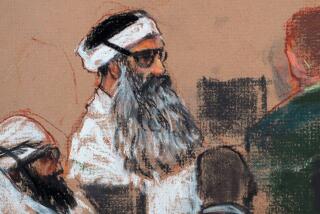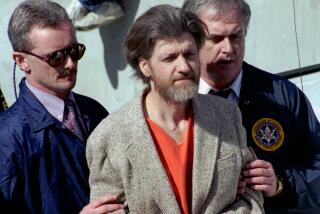Kaczynski’s Brother Denounces Rejection of Plea Bargain
- Share via
SACRAMENTO — Unabomber suspect Theodore Kaczynski’s brother lashed out Monday at the U.S. Justice Department for rejecting a plea bargain for the alleged killer amid legal maneuvering that left questions about how the onetime math whiz’s lawyers will defend him.
An attorney for David Kaczynski, whose tip led the FBI to his older sibling, said his client is “extremely saddened” by the government’s rejection of a defense proposal that would have exchanged a guilty plea for life in prison.
Washington attorney Anthony Bisceglie said the deal would have enabled the government to avoid a costly trial and “spared David and his mother the necessity to fight to save Ted’s life.”
Meanwhile, lawyers for Theodore Kaczynski filed a document Monday--a week before opening statements are scheduled--indicating that they will abandon plans to introduce testimony from experts about their client’s alleged mental illness, at least in the guilt phase of the trial.
If the former UC Berkeley math professor is found guilty, however, during the penalty phase the defense is still expected to quiz David Kaczynski and other relatives about Theodore’s alleged paranoid schizophrenia.
Kaczynski, 55, was arrested in April 1996 at his Montana cabin and charged in connection with four bombings, including two fatal attacks in Sacramento. He has pleaded not guilty.
Last spring, despite protests from Kaczynski’s family, U.S. Atty. Gen. Janet Reno authorized prosecutors to seek the death penalty.
In recent months, there has been speculation among courtroom observers that the defense--planning a mental illness defense but faced with a client who stubbornly refuses to have government psychiatrists interview him--might try to offer a deal to save his life.
Reports of the proposed plea bargain surfaced in news reports last weekend.
The Justice Department’s rejection of the plea occurred two to three weeks ago “after a great deal of study and review,” a government source familiar with the matter said Monday.
It is unclear whether the arrangement would have included federal charges that Kaczynski faces in New Jersey in the 1994 death of an advertising executive. Nor is it clear whether the deal would have restricted the ability of California Atty. Gen. Dan Lungren or other state prosecutors to file separate state charges against Kaczynski.
One attorney watching the trial said the government’s rejection of the plea bargain may be related to politics.
“I think that what’s really going on is that the government wishes . . . to appear to be inflexibly tough when it comes to terrorism,” said Joshua Dressler, a professor at Sacramento’s McGeorge School of Law. “So they aren’t willing to give away the threat of the death penalty. . . . If the jury comes back with life imprisonment, then the government can say, ‘At least we tried.’ ”
Quin Denvir, the federal public defender in Sacramento who is representing Kaczynski, could not be reached for comment.
On Monday, Denvir and co-counsel Judy Clarke offered another twist in the case by dropping plans to feature mental health experts in the trial’s first phase. Their action was contained in a one-line document filed with U.S. District Judge Garland E. Burrell.
Sacramento attorney Donald Heller, a former federal prosecutor, dismissed the move as “no big deal.”
“They really aren’t giving up anything,” Heller said. “Everything that the defense would want to do in the guilt phase . . . they can do in the penalty phase.”
Other experts suggested that the defense could still present mental health testimony in the first phase of the proceedings from David Kaczynski or other relatives--just not from psychiatrists.
Denvir has until the end of this week to spell out to the court his plans for testimony from mental health experts in the penalty phase.
Complicating matters could be a rift between Denvir and his client. In recent weeks, the defense and Burrell have had several private discussions, apparently about Kaczynski’s dissatisfaction with his legal team.
In heavily edited transcripts of the proceedings, released over the weekend, Denvir told Burrell: “We are all very unhappy and sad to be in this position, but we are in the position.”
Defense attorneys have since said the matter has been resolved.
Late Monday, prosecutors asked Burrell to release to them fuller versions of the transcripts relating to the problem between Kaczynski and his counsel.
They want verification that the dispute is resolved and will not cause delays and disruptions in the trial, according to a prosecution brief.
Gladstone reported from Sacramento and Ostrow from Washington.
More to Read
Sign up for Essential California
The most important California stories and recommendations in your inbox every morning.
You may occasionally receive promotional content from the Los Angeles Times.









